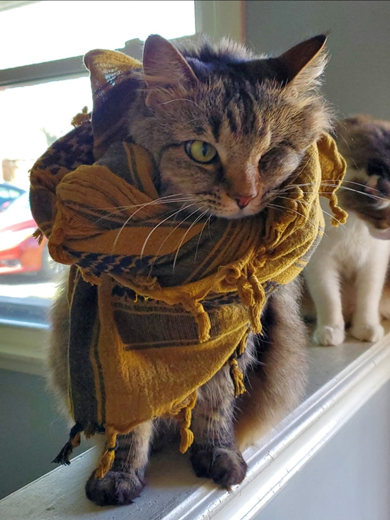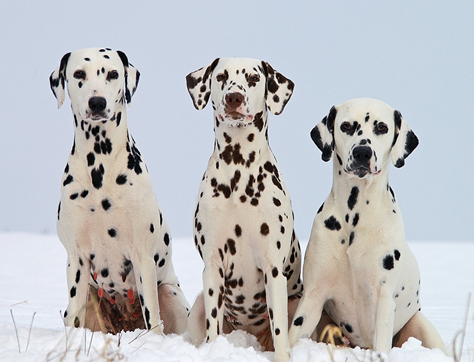Furbabies have become such an integral part of the family that it’s hard not to incorporate them into the fun and festivities of the holiday. Dressing them in little holiday outfits and buying them cute holiday collars, toys and treats is a joy for any pet parent. But your furbaby is also counting on you to keep him/her safe in the winter.
Here at Kittystead, we have written several blogs with some of our recommendations for care for pets i.e., 9 Foods Dangerous To Your Pet and Keeping Your Furbabies Safe During The Holidays. Now we are going to cover something that a lot of people talk about but still have unanswered concerns and questions. Most of us know the phrase If you’re cold then they are cold but what about the little walks outside where your delighted pup or outdoor-loving kitty is only out for short periods of time? They will be fine, right? Well, yes and no. Keep reading as we go over a few things we have learned from studying and from personal experience.

As pet parents, it is important that we pay attention to our furbaby’s ever-changing needs as the hustle and frantic movement of the holiday season can take its toll on them as well as on us. This is especially true for dogs and cats that suffer from anxiety. Most people don’t realize our furbabies have a wide range of emotions. (see Cat Body Language Told By Sabrina) The added company at home, changes in schedules and sometimes louder surroundings can be problematic and stressful to them as much as to you.

A quick tip: Since it gets darker earlier this time of year, you will need to stay one step ahead of nightfall to ensure your pet’s safety, especially those that live in colder climates. It is a good idea to use a reflective collar and leash, but also to put a light source on your dog and yourself so you can be easily seen in the dark.

For most house furbabies, the easiest way to make sure your pet stays safe during the winter is to keep them inside all the time. We know this is rarely possible with your pup/dog but we will cover that in a moment. In an ideal situation, we definitely recommend that cats be kept indoors year-round. Cats have a greater risk for infectious diseases, trauma, and being preyed upon by other animals outside. This can be very difficult but we do have helpful hints to keep them from getting bored in our previous blog How To Fight Kitty Boredom.
The easiest way to keep your furbaby dog safe from the cold is to keep him/her inside for the bulk of the day and overnight. For most dogs, on a quick five to ten-minute walk around the block (or back yard), they won’t need a vest, boots, or any special devices. Of course, there are some circumstances that call for extra attention, particularly if you live in a snowy or icy part of the country and your neighbors or town uses salt to de-ice sidewalks and streets. These grains of salt can get caught between a dog’s paw pads and cause a painful sore. If salty walking surfaces are common, you might want to put booties on your puppers. When we lived in Alaska, our Maggie Mae would not wear boots, so for her paws, we used liquid vitamin E that can be bought over the counter and applied directly to her paws. But be sure to rub the ointment in well so the dog/cat doesn’t lick it off. After a couple of treatments, the paws should show signs of great improvement. If not contact your veterinarian as skin irritation, and frostbite can cause a lot of discomforts.

While dogs in jackets are awfully cute, this is only necessary for certain breeds. Most breeds can cope well with cold conditions better than they can in hot temps. It might take most dogs a couple of days to acclimate to a cold climate, but it can take a month in hot weather. Small dogs, particularly toy breeds and those with short coats, like pointers or vizslas, or chihuahuas will be more comfortable wearing an extra layer when they go out for walks in cold temperatures. This is the same for short hair cats and the Sphinx cat, as they have no hair and need an extra layer most of the year.

A big thing to always make sure that you have is your furbaby’s tags and microchips and all information is up to date. If you are leaving town and having someone else watch your pets make sure there are enough food and medications to get through your whole trip. You do not want your pet sitter to change foods or have to call around to get medications filled. Also, be sure to leave all the contact information for your veterinarian. Additionally, let the veterinarian know who is watching your pet and if you are authorizing care and financial responsibility in your absence.

Other ways we recommend for you to be a responsible pet owner is to know when it’s too cold for pups to go outside AND if they have been out there too long. If your dog is naturally sedentary, you should not assume your pup is fine if he/she has been just sitting around out in the cold for a long time. Animals can suffer from hypothermia as well just like us humans. Older dogs that might have some cognitive dysfunction might not completely understand the situation or might forget they are outside. Do not assume that they just like to lay out in the snow for a couple of hours. If you have an older pup, you might need to initiate bringing them back inside. Now we understand that many cats do spend lots of time outdoors, but in wintertime, owners should not assume the cats are warm enough. People tend to think that cats are kind of wild and can take care of themselves, here at Kittystead our cats have debunked that myth. The cats’ winter coats do not fully protect them.

When cats get cold, the body moves the blood away from a peripheral area like the ears, the nose, the paws, the tail to go to the vital organs, like the kidneys, brain, and heart. Frostbite makes the skin look pale or grayish, and in extreme cases, it can turn black and peel off. A cat with hypothermia might seem depressed or anxious and be shivering and crying. Also, remember that cats sometimes seek out the warmth of a car engine. They will crawl up underneath and kind of hide in there and they can be injured when the engine starts. Make some noise, bang on the hood, and take a quick look to make sure there are no cats in the wheel wells before starting your car. Some cats do not have a home and will not trust a human so you could keep a heated hut for wild cats to have as a warm sanctuary. Another danger for outdoor cats is that their water supply becomes unusable. If the kitty is outside and doesn’t have access to unfrozen water, then that’s a problem.

And if your cats are used to coming and going and know their way around, make extra sure in cold weather that they have returned before you go off to work or head out for a night on the town. You do not want to let them out in the morning and then leave, and they can’t get back in. If you are an adventurous person who likes to go camping in the winter, and you want to bring your dog, or in extremely rare cases your cat, then bring a jacket, boots for them too. If you don’t want them sleeping with you in your tent be sure to have their own tent with blankets, they can stay warm in.

Some animals love to play in the snow, and their hair will stay wet for a long time after playing in the snow or going out in the rain and quickly gets matted, and matted hair can lead to skin infections and can be painful. Curly-coated breeds will get snow and ice balls on their coat after romping in the snow. If your dog has this type of hair, you will want to have your groomer leave it a bit longer for warmth but not so long it stays wet and holds snow clumps. Also, make sure your furbaby is brushed several times a week.

It’s a good chance this next item is around your house. Antifreeze is a life-threatening toxin to pets. The ethylene glycol (that’s the anti-freezing properties) tastes good to dogs and cats, so store it safely away in a container with a lid. Cats will lick that or they’ll walk through it and lick their paws. It disrupts kidney function and neurological status, so be on the lookout for spills or leaks and make sure to clean them up immediately.
Thank you everyone for joining us on today’s blog. Be sure to check out the Kittystead newsletter for tips, tricks, and upcoming events on Kittystead.com Happy holidays everyone. See you soon!





